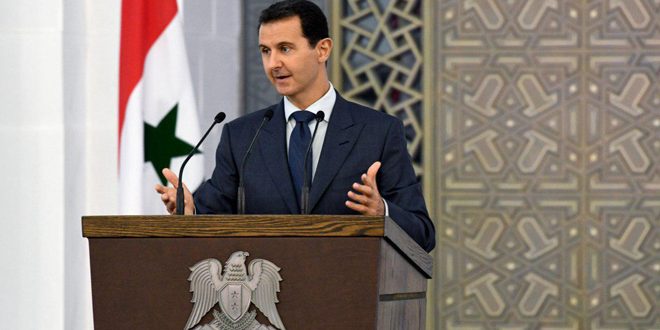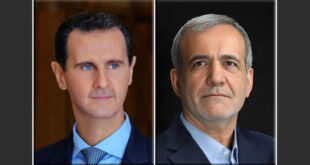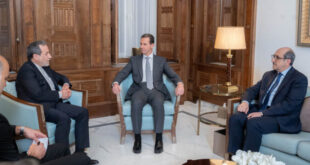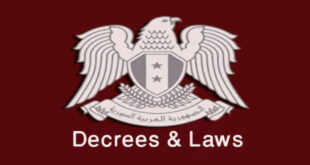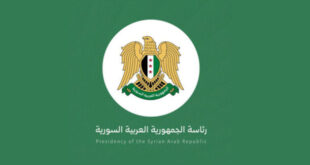Damascus, SANA – President Bashar al-Assad affirmed that the future directions of the Syrian policy will be based on continuing the fight against terrorism and crushing the terrorists everywhere on Syrian soil and continuing national reconciliations that have proved their effectiveness, in addition to increasing communication with the outside and marketing economy which has entered the stage of recovery.
In a speech delivered at the opening of the Foreign and Expatriates Ministry Conference on Sunday, President al-Assad pointed out to the Ministry Conference’s importance due to the very rapid dynamics of the events in the world, the region, and Syria in particular.
“Direct dialogue is important for creating unified visions and shaping stances,” he said.
The President said throughout history, Syria has been a target, and those who control this target gain great control over decision-making in the Middle East, and those who control decision-making in the Middle East will have important and influential say on the international arena and in the international decision, or rather in the international balance.

He went on saying that it is very superficial to say that the cause of this war is Syria’s positions and that the West wants to “discipline” the Syrian state.
“This talk true and not wrong at all. It is a fact, but it is only a part of the bigger picture. This picture is related to the international conflict and the attempt to change the international balances or consolidate them in the military sense and in the political sense and to the ensued economic and geographical outcomes. Geographical in terms of new states emerging, existing states disappearing, or changing frontiers,” the President added.
He elaborated that this conflict is a valuable opportunity for the West to “settle the account” with so many countries and subjugating countries which have refused to bow to the West’s hegemony during the past years or decades, including Syria, Iran, the Democratic People’s Republic of Korea, Belarus among others, even Russia.
“Today the West is facing an existential conflict….living in a state of hysteria whenever there is a state that wants to take part with it in the international decision-making in any field and in any place in the world,” said President al-Assad said.
The President stressed that all in all, there are two powers in this conflict; one that works in favor of the ruling elites, even if that would lead to violating all the international laws, conventions and the UN Charter and the deaths of millions of people in any place in the world, while the other power, in turn, works for maintaining the sovereignty of the countries, the international law and the UN Charter and sees in that an interest for it and for the stability of the world, noting that the Arab weight in this conflict is “zero”.
In any such kind of conflicts, he added, those who pay the price are the smaller countries. “We paid a dear price in Syria in this war, but we have managed to foil the Western project in Syria and the world,” he said, noting that this project is aimed at helping the Muslim Brotherhood to rule the region, so that they can control a society and a street using the cover of religion and lead it towards achieving the Western interests.
“Talking about foiling the Western project in the region doesn’t mean we are victorious…they have failed, but the battle is still going on. They have failed until this moment, and we haven’t won until this moment. The signs of victory are there, but signs are something and victory itself is another thing,” President al-Assad said.

President al-Assad said that “some might say ‘but they have achieved their goal. They destroyed Syria’, and I simply say that the destruction of Syria was not their goal. What was required is to take over Syria intact, but at the same time subordinate…Therefore, when calculating win and loss, I repeat what I said in 2005, around 12 years before, that the price of resistance is much lower than the price of surrender. They were talking at that time about the tree and the storm, meaning that the tree bends when there is a storm, and when the storm passes, the tree stands erect again. And my answer at that time was that when the issue was not a storm, but a bulldozer that goes deep under the ground and hits the roots, bending is no longer meaningful. The only solution is to have solid roots in order to crush the bulldozer.”
The President went on saying that “unfortunately, there are those who speak the same language after 12 years and have not learned the lessons…which means what is going on is not a matter of a storm, a tree, or a bulldozer. The truth is what is happening is a guillotine placed on the heads of everyone in this area, and the guillotine has started the cutting and claimed the lives of millions, and bending is not useful in this case. It is either to withdraw the heads from underneath it or to destroy the guillotines, there is no other solution.”
“I want that we understand that we are living in an inseparable phase, linked to the stages that preceded it for several decades,” said the President, adding that while it is true that Syria has lost its youth and infrastructure, but it has won a healthier and more homogeneous society in the real sense.
He affirmed that this homogeneity is the basis of national unity of all the people of one nation, adding that the most dangerous phase was in the first year of the war, because the sectarian dimension was present in the souls before the war, like fire under the ashes, but to a certain extent perhaps, “if more years passed and this dimension further penetrated the hearts of the Syrians and this war broke out, we could have seen a different reality that is much more dangerous.”
He affirmed that sectarian rhetoric was transient, and “what’s on tongues is not important; what’s important is what is in the hearts,” adding that “if this divisive aspect-we call it a divisive aspect- that we hear about now in different parts of our society was in the hearts, then Syria would have fallen a long time ago, and the civil war that they talk about in Western media and that they tried to convince us about would have been a fait accompli.”
“Therefore, the current reality and the cohesion of society as we see it today is a fact,” he stressed.
President noted that that changes that happened recently in the Western positions don’t mean changes in policies, adding that “the West is like a snake, changing its skin according to the situation.
He made it clear that these changes have been prompted by the steadfastness of the people, the state, the armed forces, and of course because of the support of friends, and not because the human conscience of the West has suddenly woken up.
The President highlighted that after the West failed in their attempts with igniting and supporting a “popular movement” and later with openly supporting the militants and giving them the cover of the “opposition”, they moved to “the other product, the human product. And we are now in this phase”.
He said that this product can be summed up in the West showing “complete silence” whenever the terrorists advance in any area, whereas when the Syrian army advances, they start wailing and begging for a truce using the pretext of humanitarian assistance, stressing that the real goal of the West’s calls for truces is to give the militants the opportunity to get reorganized and re-armed and to send more terrorists to support them and later carry on with the terrorist acts.
“The media and psychological war they practiced during the past years were unable to affect us in fighting terrorism or push us towards fear and hesitation… we struck terrorism since day one, and we will continue to strike it as long as there is a single terrorist in Syria… fighting terrorism is a goal and the basis for any action we take.”
The President said that “the media and psychological war they have waged over the past few years has not been able to affect us from combating terrorism or pushing us towards fear or hesitation,” adding that “this goal in the fight against terrorism has never been a hindrance to political action as long as this political action will be based on the fight against terrorism, any action, any initiative, any proposal that is not built on this basis has no value.”
President al-Assad went on saying that “on the basis of this foundation, and from this confidence, we have been very flexible with the various initiatives that have been launched since the first day of the crisis, despite our prior knowledge that most of these initiatives were launched from bad intentions and the goal of those initiatives was to reach specific results that they could not obtain through terrorism.”

He said that as everyone knows that “the outcome of these initiatives has been modest, or if we want to speak frankly away from diplomacy, all the results of these initiatives didn’t exist. What is the reason? The reason we were in a dialogue either with a terrorist or with a client or with both, meaning practically we were having dialogue with slaves…At the same time, all the proposals were against the interests of the Syrian people and against the unity of the homeland.”
He noted that Syria participated in Astana based on a clear national vision and with great confidence in the friends in Iran and in Russia.
“Erdogan is playing the role of political beggar after his support for terrorists was exposed. We don’t consider the Turkish side to be a partner nor a guarantor nor do we trust it,” he said.
President al-Assad affirmed that as long as the fight against terrorism is ongoing, there is no place for the idea of a fait accompli or division in Syria, adding that the goal of de-escalation zones is to stop bloodshed, deliver humanitarian aid, removing militants, and restoring the situation to normal.
The President affirmed that “Our Armed Forces are realizing one achievement after another every day, one week after the other, crushing terrorists and clearing the lands desecrated by terrorists,” adding that the valiant heroics of the Syrian Arab Army and supporting forces constitute a role model in the history of wars.
“We will continue in the upcoming stage to crush terrorists everywhere in cooperation with friends, and we will continue national reconciliations that proved their effectiveness, as well as increasing communication with the outside and marketing economic opportunities… The direct political, economic, and military support of our friends made the possibility of advancing on the ground greater and the losses fewer, and these friends are our actual partners,” President al-Assad asserted.
He went on saying that Syria is “not in a state of isolation as they think, but this state of arrogance makes them think in that way. There will be no security cooperation or opening of embassies or role for some states that say they are looking for a solution until they cut off their ties with terrorism in a clear and unambiguous way.”
“We will not allow enemies and rivals to achieve through politics what they failed to achieve through terrorism. We must work seriously from now to build the future Syria on solid bases,” the President said.
“Everything related to the destiny and future of Syria is a one hundred percent Syrian issue, and the unity of Syrian territory is self-evident and not up for debate or discussion,” he affirmed.
Later, a session was held during which discussions focused on means of developing diplomatic work and performance through putting clear mechanisms for administrative development, nomination criteria, adopting plans to qualify cadres, and the importance of clarifying and institutionalizing the relationship between embassies and consulates abroad on the one hand, and state ministries on the other, as the work of Foreign Ministry is not limited to the political side, but it goes to several aspects, including the economic and cultural aspects.
President al-Assad pointed to the need for reconsidering the map of Syria’s relations with countries of the world, affirming that the strategic future approach of Syria must be towards the East and here lies the importance of the role of diplomats through their permanent knowledge of the priorities of the Syrian needs and knowledge of the places of power of the countries where they work in a way to meet the aspired-for benefit in the economic, scientific and cultural sectors.
H. Sabbagh/M. al-Frieh/H. Said
 Syrian Arab News Agency S A N A
Syrian Arab News Agency S A N A
